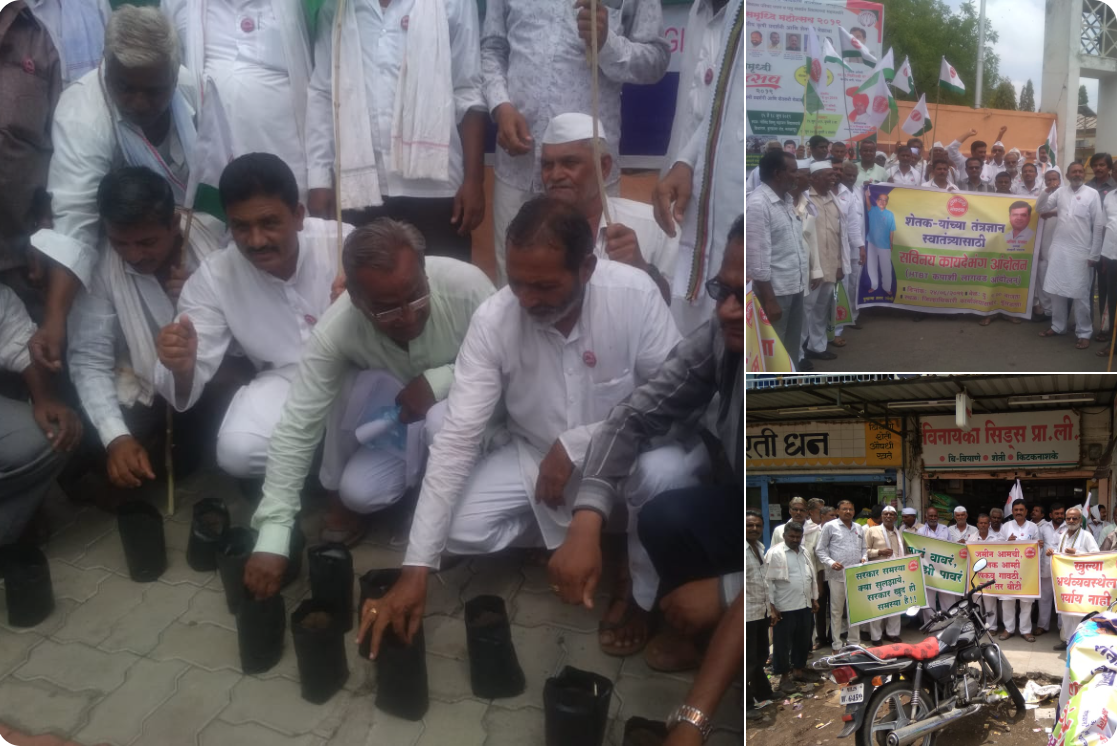Women have taken the lead in the latest civil disobedience protests as India’s smallholder farmers intensify their demand for greater access to genetically modified (GM) seeds.
Mayatai Pujadekar Patil led other women farmers June 23 as they conducted illegal plantings of GM cotton seeds on a plot of land she owns and cultivates at Pujada village in the Amravati district of Maharashtra.
Video and photos from the event show women walking and chanting with banners, before they march forward together to plant the banned seeds. About 150 women are estimated to have attended the event, braving high winds and intense heat.
While India allows the cultivation of pest-resistant Bt cotton, herbicide-tolerant Bt (HTBt) cotton is still banned and Bt brinjal — a pest-resistant eggplant — was never released, despite markedly reducing pesticide use in neighboring Bangladesh, where it has been widely adopted by brinjal farmers.
Indian farmers began their civil disobedience movement to plant illegal GM seeds on June 10, taking their strategy of non-violent “satyagraha” — a refusal to obey unjust laws — from the independence hero Mahatma Gandhi.
The movement was sparked when activists discovered that farmers in Haryana state were already growing Bt brinjal, in defiance of a government moratorium that was imposed in 2010 after a nationwide scaremongering campaign by anti-GMO groups.
One farmer, Jeevan Saini of Fatehabad district in Haryana, was identified in particular as cultivating Bt brinjal and samples from his field were sent off for laboratory tests. According to reports from a supportive farmer group:
“Following the test result, the administration sent a tractor and JCB to destroy Saini’s crop, burned it and then buried it by digging a 15-feet deep ditch on the same land. The Sainis were neither charged, nor given any piece of paper to indicate anything wrong they have done.”
In solidarity with the Sainis, farmers conducting civil disobedience in Maharashtra state have been collecting money to replace the destroyed crops, which will be handed over to the family at an upcoming public event in Fatehabad.
Meanwhile farmers across Maharashtra have begun asserting their own right to grow GM crops that are not approved for cultivation in India, even though they are already in widespread use elsewhere in the world and scientists agree they are safe.
Growing illegal GM crops can carry a five-year jail term in India. In response, anti-GM groups have called for rounding up and imprisoning the protesting farmers, with the highly-paid pro-organic speaker Vandana Shiva branding them a “gang of criminals.”
However, with numerous protests now taking place on a daily basis across 11 districts of Maharashtra, India’s authorities would likely need to throw tens of thousands of farmers into jail to suppress the movement as Shiva demands.
According to the farmers’ group Shetkari Sanghatana, which is leading the protests, as of June 24 the “satyagraha” campaign had spread from Akoli Jahagir village in Akola district to many villages in Ahmednagar, Amravati, Buldhana, Dhule, Hingoli, Jalna, Jalgaon, Parbhani, Wardha and Yavatmal .
Farmers also took their protest into town, symbolically sowing GM seeds in small bags on the street outside the office of the local authorities.
 With formal agricultural biotech science at a near standstill in India due to government intransigence and anti-GMO scaremongering, farmers have declared their intention to conduct “citizen science” trial plots to compare the different types of cotton and evaluate how the GM seeds perform.
With formal agricultural biotech science at a near standstill in India due to government intransigence and anti-GMO scaremongering, farmers have declared their intention to conduct “citizen science” trial plots to compare the different types of cotton and evaluate how the GM seeds perform.
According to a June 24 press release issued by Shetkari Sanghatana, “The farmers recognize the risk they are taking, since the unauthorized seeds they are sowing, assuming it to be HTBt, may turn out to be spurious or fake. But this only underscores the vulnerability of the farmers in the current policy paralysis over agriculture biotechnology.”
The farmers’ organization added: “The farmers are the prime victims of the prevailing regulatory environment. The farmers are only pleading for the freedom to adopt the technology of their choice, be it GM, organic or zero budget, or any other practice.”
